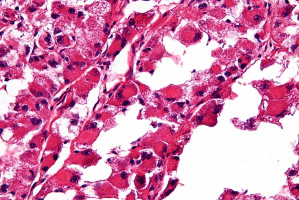
Researchers will report initial data from the phase 2 SPEARHEAD-1 trial, with afamitresgene autoleucel (afami-cel, formerly ADP-A2M4), at the American Society of Clinical Oncology (ASCO) congress.
Data will be presented in an oral presentation by Dr. Sandra D'Angelo of the Memorial Sloan Kettering Cancer Center (Abstract #11504) on June 4th.
"Patients are seeing substantial benefit from afami-cel in SPEARHEAD-1 across a broad range of cell doses and levels of MAGE-A4 expression," said Adrian Rawcliffe, Adaptimmune Chief Executive Officer.
"We have shown a high response rate and these responses are still evolving in many patients with increasing depths of response over time and encouraging durability. I am confident that SPEARHEAD-1 will support our BLA submission next year and offer a life-changing treatment for people with synovial sarcoma."
"Initial data from SPEARHEAD-1 indicate that afami-cel has the potential to offer people with synovial sarcoma a promising new treatment option where there is currently a great unmet medical need," said Dr. Sandra D'Angelo of the Memorial Sloan Kettering Cancer Center. "As clinicians, we want to be able to provide a treatment regimen that can help offer a better quality of life."
SPEARHEAD-1 data will be presented at the time of the oral presentation scheduled for June 4th during the sarcoma session taking place from 1:30 p.m. to 4:30 p.m. EDT.
Afami-cel is efficacious and well-tolerated in heavily pre treated patients based on initial data
- At the time of data cut-off (March 29, 2021), 37 patients had received afami-cel (32 with synovial sarcoma, 5 with myxoid/ round cell liposarcoma [MRCLS])
- Of the 37 patients who had received afami-cel, 4 patients were pending first efficacy assessment, and 33 had at least one scan as of data cut off (29 with synovial sarcoma, 4 with MRCLS)
- The overall response rate was 39.3% (13/33), 41.4% (12/29) for synovial sarcoma; 25.0% (1/4) for MRCLS
- Of the 29 patients with synovial sarcoma with at least one scan, 2 had complete responses (CRs), 10 had partial responses (PRs), 13 had stable disease (SD), 4 had progressive disease (PD)
- The disease control rate for people with synovial sarcoma was 86.2% (25/29) (defined as either response or stable disease)
- Of the 4 patients with MRCLS with at least one scan, 1 patient had a partial response, 2 had stable disease, and 1 had progressive disease
- Objective responses have been reported across a wide range of cell doses and MAGE-A4 antigen expression levels
- Initial durability data is encouraging, and the median duration of response has not been reached
- To date, the safety profile of afami-cel has been favourable, with mainly low-grade cytokine release syndrome and tolerable/reversible hematologic toxicities.
- Overview of SPEARHEAD-1 trial design
SPEARHEAD-1 is a Phase 2, open-label trial for people with advanced synovial sarcoma or MRCLS to evaluate the efficacy, safety, and tolerability of afami-cel.
Afami-cel SPEAR T-cells target MAGE-A4+ tumours.
MAGE-A4 is highly expressed in synovial sarcoma and MRCLS in the context of HLA A*02. Compelling clinical responses in patients with synovial sarcoma were previously reported with afami-cel in a Phase 1 trial (CTOS 2020).
Approximately 90 patients are planned to be treated: 45 in Cohort 1 and 45 in Cohort 2. Enrolment in Cohort 1 is complete, and Cohort 2 is currently recruiting.
The primary efficacy analysis will be for Cohort 1 only, which will be used to support the BLA filing next year.
No formal hypothesis testing is planned for Cohort 2. Cohort 2 will strengthen the efficacy and safety database and will aid in descriptive sub group analyses.
Eligible patients were ? 16 and < 75 years, HLA*02 positive with MAGE-A4 expression in ? 30% of tumour cells that were ? 2+ by immunohistochemistry. Eligible patients received afami-cel doses between 1-10 × 109 transduced T-cells after receiving lymphodepleting chemotherapy.
The primary endpoint is overall response rate per RECIST v1.1 by independent review. The primary endpoint will be evaluated using a one-sided exact-based Clopper-Pearson 97.5% confidence interval (CI). If the lower bound of the CI exceeds the response rate reported with historical second line therapy(ies), the trial will have met the pre-specified threshold for demonstrating efficacy.
An independent Data Safety Monitoring Board reviews ongoing safety and benefit:risk during the interventional phase of the trial.
Source: Adaptimmune
We are an independent charity and are not backed by a large company or society. We raise every penny ourselves to improve the standards of cancer care through education. You can help us continue our work to address inequalities in cancer care by making a donation.
Any donation, however small, contributes directly towards the costs of creating and sharing free oncology education.
Together we can get better outcomes for patients by tackling global inequalities in access to the results of cancer research.
Thank you for your support.